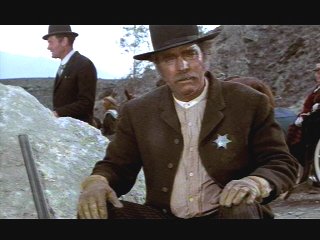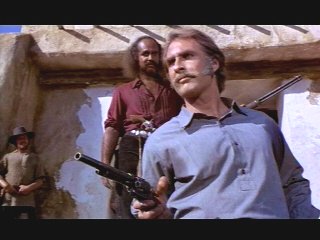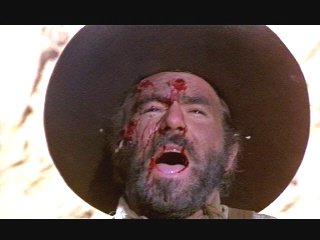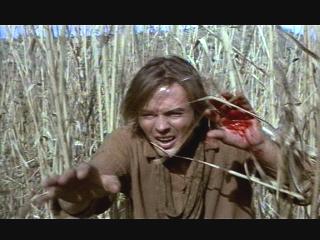
|
|
|
|
|
|
|
|
|
|
|
|
|
(1971) Director: Edwin
Sherin
Whenever author Elmore Leonard is mentioned nowadays, it is almost a certainty that both you and whatever source happens to be mentioning him will be thinking of the kind of writing he's been associated with in recent years. Namely, novels like Get Shorty, Out Of Sight, and Rum Punch, which center around or flirt with disreputable types like mobsters or hardened criminals, all in colorful settings with plenty of offbeat characters on the sidelines. Not that many people know - or have simply forgotten - is that Leonard got his start and anchor in the writing market not by writing novels of this nature, but instead by writing western novels and short stories, which there was a gigantic market for when he first got published in the early '50s. A few of these have been made into movies over the years - 3:10 To Yuma and The Tall T were both based on short stories of Leonard's, Last Stand At Saber River was made into a cable movie a few years back, though the most well-known movie made from his western stories has to be the Paul Newman-starring Hombre. Oddly, one other film adaptation of a Leonard western
also has a big star attached to it but hasn't managed to get near to
the level of pubic knowledge Hombre
has, even though it was made past the unofficial cut-off date of 1970
many TV stations use in deciding if a movie is "appropriate" to
broadcast or not. That movie is Valdez Is Coming with
Burt Lancaster, and it's a shame it isn't better known because not only
does it deliver in its promise to be a compelling revenge western, it
actually "The little guy" in this Leonard tale is Bob Valdez (Lancaster), a part-time constable for the Mexican part of the town of Lanoria, located near the border. Despite having the responsibility of helping to enforce the law in the area, at best he seems to be regarded with a polite form of near-contempt by the American residents and town councilmen (played by Ralph Brown and Star Wars' Phil Brown). In fact, the only reason he is apparently called to the crisis that opens the movie is that the town's sheriff happens to be away at the time. The local land baron Frank Tanner (played by Hill Street Blues' Jon Cypher), with the help of his henchmen, have cornered a man Tanner says is the fugitive responsible for the past murder of the husband of his mistress/fiancÚ (Susan Clark of Webster), Gay Erin. (No giggling, please.) Arriving on the scene, Valdez tries his best to end the standoff peacefully, managing to gain the trust of the holed-up man who directs him to evidence that proves his innocence. But before Valdez can get hold of this evidence and display it to Tanner and the observing townspeople, Tanner's slimiest henchman (Richard Jordan) interferes, and the resulting violence that breaks out includes Valdez being forced to kill the holed-up gunman who starts firing at him. Though it was clearly a case of self-defense and Valdez was not responsible for provoking the man into firing, Valdez is clearly devastated by having to shoot the man and seems to feel not only some responsibility for the situation but to take care of the man's Apache widow. So shortly after the dead man's innocence is proved, he approaches the town council to compensate the widow with $200. The council offers to pay half that, if Tanner will pay the other half. But when Valdez subsequently approaches Tanner with this request and a gentle reminded that his mistake in identity lead to this tragedy, Valdez is not only immediately rebuffed, but is harassed and humiliated by Tanner's henchmen. This alone would stop most anyone from any further attempts - and may have even stopped Valdez himself had it happened earlier. But something clearly has happened to Valdez and he does not stop in his pursuit of Tanner giving compensation. Though when he tries again, and a little more forcefully, he is not only humiliated again, but done so in a long and gruelling way that almost ends up killing him. This still does not stop Valdez; after he recovers, he continues his pursuit of his goal - though not before preparing his scatter gun and going under his bed to get out his old cavalry uniform and the trusty Sharpe rifle he used in those secret past days of glory. It would be perfectly understandable if you were to
think that what happens more Though as Valdez's blows against Tanner start to increase, the inevitable question comes up as to why Tanner doesn't admit defeat and cut his losses. We never learn the answer to that question; it isn't even brought up by Tanner's henchmen as they personally start feeling Tanner's losses. Even just a few works of explanation from Tanner would have gone a long way in not only answering this, but giving us insight into his character. Still, while we never find out just what is making him tick here, he is still an acceptable villain. Cypher skillfully adds a good feeling of insensitivity and ruthlessness to the character of Tanner when speaking the lines of dialogue he's given. And while the screenplay may not make clear why Tanner is being so stubborn about this issue, it does give him a few interesting character quirks, the most interesting being his relationship with Gay. Though he plans to marry her and has been hunting for her husband's killer, he keeps referring to her as "whore" and "bitch" (never her actual name), and after Valdez kidnaps her and he gets a report back on her condition, his first question is whether she was tied up and unable to run - obviously secretly afraid she might now be running with Valdez by choice. This could also be interpreted as Tanner having his own sense of honor, feeling that honor comes from absolute control and not showing loss to anyone - and this might also explain why Tanner is being so stubborn over a lousy $100. Susan Clark manages to stand up to Cypher, doing a good
job at being Gay. (No no, not... oh, forget it.) She gives her
character a toughness that makes her not the stereotypical land baron
mistress, and only going so far as to be believable for the time and
not in a revisionist P.C. manner. Her character turns out to be
completely different in two other ways. First of all, though her
character sympathizes And speaking of Valdez, no proper review of this movie would be without a mention of Burt Lancaster. In the past there have been several complaints from various people about the casting of the all-American blue-eyed Lancaster as a Mexican. While I do agree Lancaster isn't exactly in the first group of Hollywood stars you would think of when it comes to casting the role of a Mexican, it should be pointed out that Mexico has had a history of race mixing; even today you will find a number of citizens in that country who have hair and skin of a lighter shade than what is typically considered "Mexican". With that complaint settled, Lancaster's performance can now be focused on more clearly, and it is decidedly mixed. He does find the right note when it comes to making Valdez sympathetic; after the tragedy early on you genuinely sense his internal pain, and you can not only believe his subsequent attempts to make right, but why he is so obsessed by doing so. Though when he does arm himself and set out to make things right, it doesn't quite feel right despite all those efforts of Lancaster to make the audience root for his character. Before his second humiliation that almost lead to his death, he was so soft-spoken, almost feeble-like to the point of Alzheimer's in his speech and movements that seeing him dart around the desert landscape commando-style seems way out of character. It's hard to believe a former cavalry man who has retained all of his skills could be so weak out of the army, especially considering he's now a constable. Even though Valdez gets involved in this cat-and-mouse
game with Tanner from this point on to the end of the movie, which
expectedly leads to struggles that could be considered life-or-death,
there is a curious lack of intensity to many of these action sequences.
I never thought stalking prey or evading it in the middle of the
wilderness could ever feel so... ordinary... but director Sherin seems
unsure many times how to do so. (He later found his niche in directing
dialogue-driven television shows like Law & Order.) Sherin
does occasionally hit the
Check for availability on Amazon (VHS) See also: Chino, The Stalking Moon, Stranger's Gold |
 shares a
lot with Leonard's future works. Though set in the past in a different
environment, you can see themes here just like the ones found in his
more recent works - mainly "the little guy" going against seemingly
impossible odds against a big enemy, as well as themes of honor and
"doing the right thing". These and other themes found in Valdez
Is Coming help to make this western a richer experience than
you might expect. It's far from being a perfect or great western, but
while it may be lacking in several areas, it manages to sink its teeth
and claws into one key ingredient - revenge. The movie knows exactly
how to make a tale of revenge compelling for an audience, not just in
how the actual revenge should be played out, but how the characters and
the situation should be earlier set up so that we are rooting for the
hero to succeed. Revenge sure can be sweet to see sometimes.
shares a
lot with Leonard's future works. Though set in the past in a different
environment, you can see themes here just like the ones found in his
more recent works - mainly "the little guy" going against seemingly
impossible odds against a big enemy, as well as themes of honor and
"doing the right thing". These and other themes found in Valdez
Is Coming help to make this western a richer experience than
you might expect. It's far from being a perfect or great western, but
while it may be lacking in several areas, it manages to sink its teeth
and claws into one key ingredient - revenge. The movie knows exactly
how to make a tale of revenge compelling for an audience, not just in
how the actual revenge should be played out, but how the characters and
the situation should be earlier set up so that we are rooting for the
hero to succeed. Revenge sure can be sweet to see sometimes. or less from this
point on involves Valdez determined to wipe Tanner off the face of the
earth, blasting everything and everyone that blocks the way to his
target. But what actually happens is somewhat more complex that that
simplistic turning point and resolution, both of which are a dime a
dozen in the revenge genre. Actually, Valdez doesn't exactly go on a
rampage of revenge after he recovers from the hands of Tanner's
henchmen. Undeniably Valdez does attempt to satisfy some personal beefs
during his campaign, but he only seems to try and work on them if both
the opportunity happens to comes during his journey and if he can spare
the time. Though he is fighting against Tanner and his henchman, Valdez
is not battling for personal revenge - he is fighting for what he feels
has been a miscarriage of justice, fighting so he can somehow bring a
correction to this wrong. This is actually made clear very early on.
Soon after he starts his campaign, Valdez manages to sneak up to Tanner
and hold him at gunpoint, but he doesn't shoot or hurt him; instead
Valdez just hisses, "One hundred dollars!" and attempts to get Tanner
to open his safe. Though Valdez is trying to get Tanner to pay up, his
obsession is not really for the money, since while he was recovering
the Apache woman suddenly disappeared to parts unknown. To Valdez, the
payment of this money means much more - both an admission of guilt and
a sign of wanting to make amends by the guilty party. But Tanner is an
extremely stubborn man, one who sticks to his gun once he's made a
final decision, and even Valdez seems to realize it will take a lot of
effort on his part to get Tanner to break - that is, if it can even be
done. Despite the question of this goal being even possible, Valdez
soon proves he's no weakling and that he's not going away any time
soon.
or less from this
point on involves Valdez determined to wipe Tanner off the face of the
earth, blasting everything and everyone that blocks the way to his
target. But what actually happens is somewhat more complex that that
simplistic turning point and resolution, both of which are a dime a
dozen in the revenge genre. Actually, Valdez doesn't exactly go on a
rampage of revenge after he recovers from the hands of Tanner's
henchmen. Undeniably Valdez does attempt to satisfy some personal beefs
during his campaign, but he only seems to try and work on them if both
the opportunity happens to comes during his journey and if he can spare
the time. Though he is fighting against Tanner and his henchman, Valdez
is not battling for personal revenge - he is fighting for what he feels
has been a miscarriage of justice, fighting so he can somehow bring a
correction to this wrong. This is actually made clear very early on.
Soon after he starts his campaign, Valdez manages to sneak up to Tanner
and hold him at gunpoint, but he doesn't shoot or hurt him; instead
Valdez just hisses, "One hundred dollars!" and attempts to get Tanner
to open his safe. Though Valdez is trying to get Tanner to pay up, his
obsession is not really for the money, since while he was recovering
the Apache woman suddenly disappeared to parts unknown. To Valdez, the
payment of this money means much more - both an admission of guilt and
a sign of wanting to make amends by the guilty party. But Tanner is an
extremely stubborn man, one who sticks to his gun once he's made a
final decision, and even Valdez seems to realize it will take a lot of
effort on his part to get Tanner to break - that is, if it can even be
done. Despite the question of this goal being even possible, Valdez
soon proves he's no weakling and that he's not going away any time
soon.  with
Valdez, she does not fall in love with him - and for that
matter, Valdez does not fall in love with her. Though the two
characters have some differences, they also have a genuine respect for
each other. The second interesting thing is that the independent and
strong-thinking Gay has not been forced into a relationship with
Tanner, but has surprisingly entered the relationship by her own free
will - for reasons, when revealed, make her character no longer 100%
sympathetic, and in an additional way unlike those other western
heroines. The other supporting characters in Valdez Is Coming may
not be as complex as her, but they have one or more interesting things
about them that make you take notice whenever they are in a scene. As
Valdez's best friend, Frank Silvera gives his character warmth and has
two great conversations with Valdez that are pure Elmore Leonard. While
Barton Heyman (playing the chief henchman "El Segundo") has hardly any
dialogue, he has such a wild animal magnetism around him that you can't
help but keep you eyes on him even when he's saying or doing nothing.
Then there is Richard Jordan as the young henchman B.J. Though he just
has a few short scenes, in each one he manages to be so amazingly
slimy, so utterly hateful that you want Valdez to forget the $100 and
blast him with his scattergun - for starters.
with
Valdez, she does not fall in love with him - and for that
matter, Valdez does not fall in love with her. Though the two
characters have some differences, they also have a genuine respect for
each other. The second interesting thing is that the independent and
strong-thinking Gay has not been forced into a relationship with
Tanner, but has surprisingly entered the relationship by her own free
will - for reasons, when revealed, make her character no longer 100%
sympathetic, and in an additional way unlike those other western
heroines. The other supporting characters in Valdez Is Coming may
not be as complex as her, but they have one or more interesting things
about them that make you take notice whenever they are in a scene. As
Valdez's best friend, Frank Silvera gives his character warmth and has
two great conversations with Valdez that are pure Elmore Leonard. While
Barton Heyman (playing the chief henchman "El Segundo") has hardly any
dialogue, he has such a wild animal magnetism around him that you can't
help but keep you eyes on him even when he's saying or doing nothing.
Then there is Richard Jordan as the young henchman B.J. Though he just
has a few short scenes, in each one he manages to be so amazingly
slimy, so utterly hateful that you want Valdez to forget the $100 and
blast him with his scattergun - for starters.  mark, such as with an
extremely violent sequence when Valdez sneaks behind three pursuers,
and an awesome moment later when Valdez uses his Sharpe rifle on a
pursuing party over half a mile away. (This and other instances of
violence, as well as a few instances of nudity, explains why the movie
recently had its rating increased a
notch to PG-13.) He also uses manages to put a fresh spin on shooting
in Spain, in fact using many of the same locations Italians used in
their spaghetti westerns. There's a more gritty look and feel to these
hills and rocks than usual, and this desolation seems an appropriate
setting for a showdown between two extremely stubborn men. And though I
certainly won't reveal how the movie ends, I will say that this ending
manages not only to be different, but satisfying all the same -
no more will I say. Though Valdez Is Coming has some
parts that make for a bumpy ride at times, it takes you though enough
new places to still make the journey worth the occasional jarring
moment.
mark, such as with an
extremely violent sequence when Valdez sneaks behind three pursuers,
and an awesome moment later when Valdez uses his Sharpe rifle on a
pursuing party over half a mile away. (This and other instances of
violence, as well as a few instances of nudity, explains why the movie
recently had its rating increased a
notch to PG-13.) He also uses manages to put a fresh spin on shooting
in Spain, in fact using many of the same locations Italians used in
their spaghetti westerns. There's a more gritty look and feel to these
hills and rocks than usual, and this desolation seems an appropriate
setting for a showdown between two extremely stubborn men. And though I
certainly won't reveal how the movie ends, I will say that this ending
manages not only to be different, but satisfying all the same -
no more will I say. Though Valdez Is Coming has some
parts that make for a bumpy ride at times, it takes you though enough
new places to still make the journey worth the occasional jarring
moment.